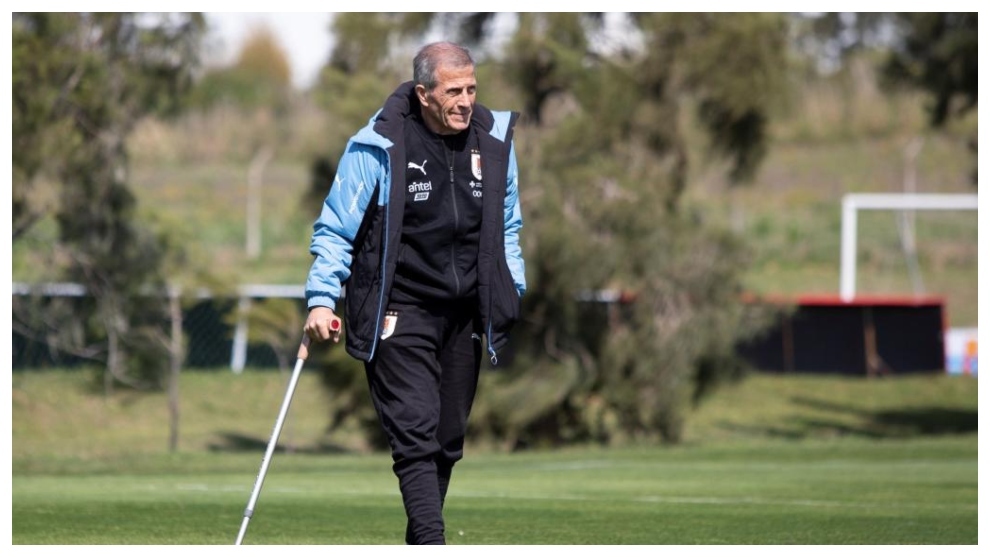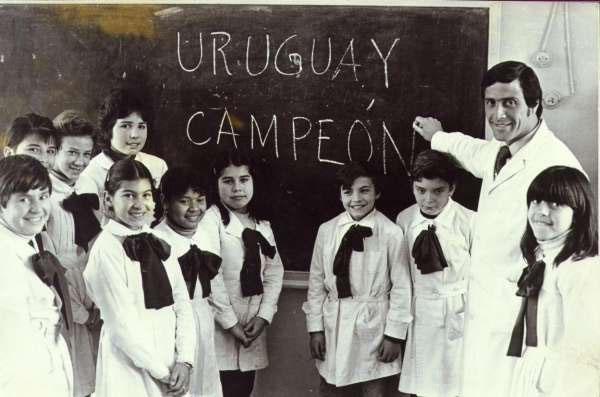ORscar Washington Tabárez (Montevideo, 1947) attends Primera Plana from his country. An hour of quiet conversation, very ‘Uruguayan’, with calm in each answer. The ‘Master’ must be respected his times as a wise man. There are not so many teachers in this soccer thing. Let’s enjoy it.
QUESTION. What memory do you keep of your campaign in Spain [97-98 en el Oviedo]?
ANSWER. A rich life experience in a very orderly city. I remember a lot of rain in Asturias. I saw all possible shades of green. If I had liked to be there more? In this profession, you never know. I didn’t even imagine that my place would be here in the National Team since 2006 …
Q. You are facing your seventh Copa América, this one with very different nuances. That waits?
R. There is a lot of uncertainty about the Covid. Before these weeks, we had not played by FIFA date since November 2019. We did not compete again. In any selection, there are player renewal processes and, not being able to see them in action, that has been interrupted. But for a Uruguayan the Copa América is history. We are the country that has won it the most times and that generates a very great historical responsibility.
Q. You are a promoter of values that seem to be being lost. Do you consider yourself a coach from another era?
A. Football evolves, but in the end it is the same. I do not feel from another time. In Uruguay there is something that is clear to us: the attitude. That is not lost. For this reason, for example, we were able to beat more powerful countries or with more resources, such as Portugal, in the last World Cup. In football there are fads, such as possession, which is important … as long as it is a vehicle to win. Sometimes it is taken as a ‘mantra’ in teams not prepared to have the ball. What’s the use of having 70% possession if you then tie at zero? Because most of the passes were made in the defensive zone.
I don’t feel from another time; football is changing, but in the end it is only one
P. Why does Uruguayan soccer triumph with so few means?
R. Our big secret is children’s soccer, baby soccer, as we call it. All our stars have passed through there. And the other secret is passion. I’m sure that right now, while you and I are talking, somewhere in Uruguay, in a children’s field, a boy is playing who in six years will be in the senior team. There are many children rallying anywhere, on a small court, in confined spaces … that is baby football. It is a unique way to develop the game. Then, only 0.14% reach Europe. That is, 99% do not achieve their dream. And all in a country of 3.5 million inhabitants.
Q. Only 0.14%? It seems more.
R. There are few who arrive. It is true that those teach the values to the rest. Not to fall, to persist … And that also creeps into the public, which is changing lately. Young people and a large female audience come to see the selection.
P. How do you survive, and excel, in a football so different from ‘yours’?
R. I prepare for everything, together with my work group. If I have to lose, let it be with dignity. And if we have to win, we celebrate without fanfare. Because everything in football is temporary, victory and defeat. I do not know anyone who always wins, and less in South America. Answering your question, I know that we coaches are always passing through. The security of a contract is short-lived in Uruguay. They fire you and give you three months of severance pay only.
Q. How do you manage social media with your players?
R. Relationships and opinions are important, but behind some things that can be positive there are many people who hurt. In the lower teams, we talk a lot about this of the networks. We invited expert people and we discussed it, because there are players who are very aware of the networks. It can become unhealthy and that is dangerous.
Q. You remind us of Vicente del Bosque. Do you feel reflected in it?
A. Of course. Besides, I feel like his friend, even though we haven’t talked for a long time. We were partners on the FIFA Committee years ago. We talked a lot and we agreed on values. He has a special life story and his conception of important things always caught me. Taking advantage of this, I send him a hug and let him know that he will always be in my memory.
If I have to lose, let it be with dignity; if we have to win, we celebrate without fanfare
Q. I throw you some names. Do you think that you will have to regulate Luis Suárez in the Cup?
R. That, the regulation, applies to everyone. There are many games in a short time. I have to rely not only on an eleven, but on a template. Cavani, Stuani, Muslera, Godín … are in the same case. I have discussed it with them sometime. Conceptually, they are at their peak. Maybe they are not like 10 years ago, but they have other extras that add value to the team. Suárez changed teams and continued to score. Cavani, the same. They have experience … and experiences.
The longest-serving coach: 2006
Tabárez is an institution in Uruguay … and in the world. He is the current coach with the longest tenure in office, since February 2006. A few months later, Löw arrived in Germany, but he will leave his post after this European Championship. Tabárez, despite a few weeks of uncertainty in the middle of the pandemic, has a contract until Qatar 2022.
1 Oscar W. Tabárez Uruguay February 2006.
two Joachim Löw Germany August 2006.
3 Koldo alvarez Andorra February 2010.
4 Luc holtz Luxembourg August 2010.
5 Didier deschamps France July 2012.
P. Fede Valverde has become a symbol of Madrid in a short time. Do you appreciate more of it its claw or its quality?
R. He reached the national team at the age of 13. His talent was already striking, but he was small, skinny, and almost pathologically shy. He spoke very little. But its physical evolution has been surprising. He has interventions in speed that he did not show before, not even when he was in Peñarol. He is a very available boy. It even offers to play as a tip marker [lateral] against Liverpool. And he did well. It is very professional.
Q. What is your ideal position?
R. Fede is a midfielder, whether he is a double ‘5’, an insider in a line of three, or even a backward midfielder, if needed, although, as Casemiro said, perhaps there his talent is diluted a lot.
Guardiola is the best coach of the moment … to ‘cruyffismo’ he added defensive improvement
P. Are you concerned about Giménez’s injuries?
R. He is a talent since he debuted against Colombia. I remember that that day it was the turn of an expert to score, Falcao. Josema was 18 years old and in the middle of the game he began to distract Falcao by asking him: ‘What car do you have?’ Giménez is fast, terrific in the air and mature.
Q. Do you see Arambarri in a big one now?
A. That is up to you. I have known him since youth and he always stood out. In Getafe he has been important and his potential deserves that he continue with us.
P. Although he is not of your generation, what do you like about Pep Guardiola?
R. First, what a great player he was. I remember that in 1994 I went to see him train and spoke with Johan Cruyff. I enjoyed it like I was a fan. I remember they did a rondo to an amazing touch. Wonderful! Sebastián Abreu told me a lot about Pep, as they coincided as players. And he was already crazy about this. Not in vain, the best Barça has been with Pep as coach and now City has been the best team in Europe. For me, he is the best coach of the moment. He has added a lot of defensive improvement and a great attitude concept to his cruyffista style. They lose the ball and immediately everyone goes to get it back. Besides everything, I think he is humble. And that is the basis for doing great things.
Q. What do you think players appreciate most about you, your values or your tactic?
R. I do not know, it is a question for them. There is a book, ‘El legado de Tabárez’, that came out here, and through it I learned some things that they thought about me. But that is not important. Beyond the fact that I was a teacher, the relationship with the footballer is becoming more and more difficult and I believe that the times indicate that a coach must also be an educator. Not a teacher or a teacher, be careful. It has to teach values, educate through the word, but also, and above all, through actions. If we say something different from what we do, the footballer will never respect us.
I was caught by Del Bosque’s conception of the important things in life
Q. When you retire from football, will you be satisfied with your career?
R. Soccer has given me much more than I imagined. When I was a kid, I didn’t even think I was going to play First. He lived in a neighborhood where being a footballer was not prestigious. For this reason, I am not dazzled by any success he may have had as a coach. My way of being does not make me change what I thought in my childhood. Triumphs and defeats are fleeting. Everything happens.
Q. If the president of the Uruguayan Federation comes tomorrow and tells him that he is preparing a statue of him to put it in the Centenario stadium. What would you answer?
R. I would say no, let it be. For that kind of thing, it deserves that the person is dead [El Maestro se echa alguna sonrisa irónica]. I want to live a few more years. I know that I am already at the limit in my work. And not because of passion, mind you, but because of the situation in life.
He has earned the respect of the whole country
The word is ‘respect’. That is what ‘El Maestro’ Tabárez has earned here. And not only by the players, but by the people and journalism. From the dressing room, we have always appreciated their work in the formation of groups, something that has been noticed in the different classifications for the World Cup, which previously cost us much more. And that we have undergone several generational changes, but the ‘mister’ was always there to unite our entire group.
Then, personally, each player has had an experience with him. But, in general, beyond the individual process, we all – I believe – appreciate the ‘Master’ in his dual role as transmitter of values and also, be careful, in his tactical facet as a coach. That nobody thinks that he is a weak technician in the tactical thing. He knows how to prepare, and very well, the matches.
Subscribe to the BRAND Weekend Newsletter and receive in your email, Saturdays and Sundays first thing in the morning, the reports, interviews and in-depth graphics of MARCA and those of its Sunday supplement ‘Primera Plana’.


